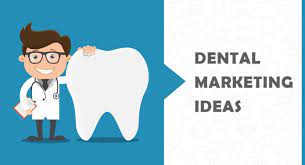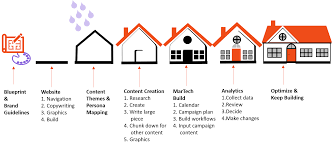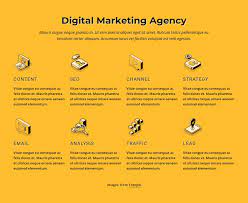The Power of Effective Online Marketing
In today’s digital age, having a strong online presence is crucial for the success of any business. Effective online marketing strategies can help businesses reach a wider audience, increase brand awareness, and drive sales. Here are some key strategies to consider:
Search Engine Optimization (SEO)
Optimizing your website for search engines is essential for improving your online visibility. By using relevant keywords, creating high-quality content, and building backlinks, you can improve your website’s ranking on search engine results pages.
Social Media Marketing
Social media platforms offer a powerful way to connect with your target audience and build brand loyalty. By creating engaging content, running targeted ads, and interacting with followers, you can effectively promote your products or services.
Email Marketing
Email marketing remains one of the most effective ways to communicate with customers and drive conversions. By sending personalized messages, offering exclusive deals, and segmenting your email list, you can nurture leads and retain customers.
Content Marketing
Creating valuable and relevant content is key to attracting and retaining customers. Whether it’s blog posts, videos, infographics, or podcasts, investing in content marketing can help establish your brand as an authority in your industry.
Pay-Per-Click (PPC) Advertising
PPC advertising allows businesses to reach their target audience through paid ads on search engines and social media platforms. By carefully selecting keywords, monitoring performance metrics, and optimizing ad campaigns, you can drive traffic to your website and increase conversions.
In conclusion, effective online marketing is essential for businesses looking to thrive in today’s competitive landscape. By implementing a combination of SEO, social media marketing, email marketing, content marketing, and PPC advertising strategies, businesses can effectively reach their target audience and achieve their marketing goals.
Mastering Digital Growth: 9 Essential FAQs on Effective Online Marketing Strategies
- What is online marketing and why is it important?
- How can search engine optimization (SEO) improve my online visibility?
- What are the benefits of social media marketing for businesses?
- How can email marketing help in driving conversions?
- What is content marketing and how does it benefit businesses?
- What are the key components of a successful PPC advertising campaign?
- How can businesses measure the effectiveness of their online marketing strategies?
- What role does mobile marketing play in effective online marketing?
- How can businesses stay updated with the latest trends in online marketing?
What is online marketing and why is it important?
Online marketing refers to the use of digital channels and strategies to promote products or services on the internet. It encompasses a wide range of tactics such as search engine optimization (SEO), social media marketing, email marketing, content marketing, and pay-per-click (PPC) advertising. Online marketing is crucial for businesses in today’s digital world because it allows them to reach a global audience, increase brand visibility, drive website traffic, generate leads, and ultimately boost sales. By leveraging online marketing strategies effectively, businesses can stay competitive, build customer relationships, and achieve their marketing objectives in a cost-effective and measurable way.
How can search engine optimization (SEO) improve my online visibility?
Search engine optimization (SEO) plays a crucial role in enhancing online visibility by optimizing a website’s content and structure to align with search engine algorithms. By incorporating relevant keywords, improving website speed and user experience, and building quality backlinks, SEO helps websites rank higher on search engine results pages. This increased visibility not only attracts more organic traffic but also boosts brand credibility and trustworthiness among users searching for specific products or services. Ultimately, a well-executed SEO strategy can significantly improve a website’s online presence and drive targeted traffic that is more likely to convert into customers.
What are the benefits of social media marketing for businesses?
Social media marketing offers a multitude of benefits for businesses looking to enhance their online presence and connect with their target audience. One key advantage is the ability to increase brand awareness and reach a wider audience through platforms like Facebook, Instagram, and Twitter. By engaging with followers, sharing valuable content, and running targeted ads, businesses can build brand loyalty and drive customer engagement. Additionally, social media marketing provides valuable insights into consumer behavior and preferences, allowing businesses to tailor their marketing strategies for better results. Overall, leveraging social media as a marketing tool can lead to increased website traffic, higher conversion rates, and ultimately, greater business success in the digital realm.
How can email marketing help in driving conversions?
Email marketing plays a crucial role in driving conversions by providing businesses with a direct and personalized way to engage with their audience. Through targeted email campaigns, businesses can deliver relevant content, promotions, and product updates to subscribers who have already shown interest in their brand. By nurturing leads through strategic email sequences, businesses can guide recipients through the sales funnel, ultimately encouraging them to take action, whether it’s making a purchase, signing up for a service, or engaging with the brand in some other meaningful way. The ability to segment email lists based on user behavior and preferences allows for tailored messaging that resonates with recipients, increasing the likelihood of conversion and fostering long-term customer relationships.
What is content marketing and how does it benefit businesses?
Content marketing is a strategic approach that involves creating and distributing valuable, relevant, and consistent content to attract and retain a targeted audience. This content can take various forms, such as blog posts, videos, infographics, and social media posts. The primary goal of content marketing is to engage with customers, build brand awareness, establish credibility, and ultimately drive profitable customer action. By providing informative and entertaining content that addresses the needs and interests of their target audience, businesses can enhance their online visibility, generate leads, increase website traffic, improve customer loyalty, and ultimately boost their bottom line.
What are the key components of a successful PPC advertising campaign?
When considering the key components of a successful PPC advertising campaign, several factors come into play. Firstly, thorough keyword research is essential to target the right audience and maximize ad visibility. Crafting compelling ad copy that is both relevant and engaging is crucial for attracting clicks. Setting clear goals and defining key performance indicators (KPIs) will help measure the success of the campaign. Continuous monitoring and optimization of ad performance, including adjusting bids, targeting parameters, and ad creatives, are vital for ensuring optimal results. Additionally, landing page optimization to provide a seamless user experience and encourage conversions is a critical component of a successful PPC campaign. By incorporating these elements effectively, businesses can create impactful PPC campaigns that drive traffic, generate leads, and increase conversions.
How can businesses measure the effectiveness of their online marketing strategies?
Businesses can measure the effectiveness of their online marketing strategies through various metrics and analytics tools. Tracking key performance indicators such as website traffic, conversion rates, click-through rates, and social media engagement can provide valuable insights into the impact of their marketing efforts. Additionally, setting specific goals and objectives, conducting A/B testing, and analyzing customer feedback can help businesses evaluate the success of their online campaigns. By continuously monitoring and analyzing data, businesses can make informed decisions to optimize their strategies for better results and ROI in the competitive online landscape.
What role does mobile marketing play in effective online marketing?
Mobile marketing plays a crucial role in effective online marketing by catering to the growing number of users who access the internet through mobile devices. With the increasing popularity of smartphones and tablets, businesses need to optimize their marketing strategies for mobile platforms to reach a wider audience. Mobile marketing allows businesses to create targeted campaigns, deliver personalized content, and engage with customers in real-time, leading to higher conversion rates and improved brand visibility. By leveraging mobile-friendly websites, mobile apps, SMS marketing, and location-based services, businesses can enhance their online presence and stay ahead in the competitive digital landscape.
How can businesses stay updated with the latest trends in online marketing?
To stay updated with the latest trends in online marketing, businesses can engage in continuous learning and research. Subscribing to industry newsletters, following reputable marketing blogs and websites, attending webinars and conferences, and participating in online forums can provide valuable insights into emerging trends and best practices. Additionally, networking with other professionals in the field, joining relevant social media groups, and investing in professional development courses can help businesses stay ahead of the curve and adapt their marketing strategies to meet evolving consumer demands. By remaining proactive and open to experimentation, businesses can effectively navigate the dynamic landscape of online marketing and maintain a competitive edge.




